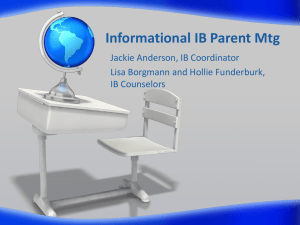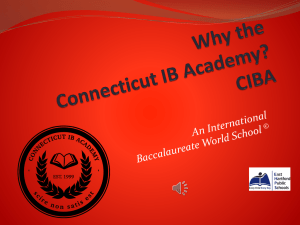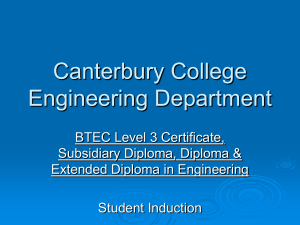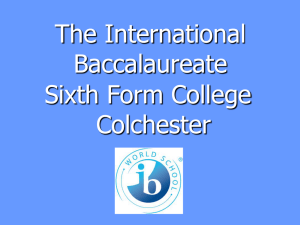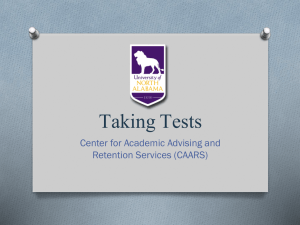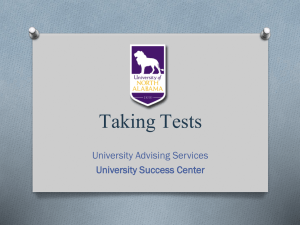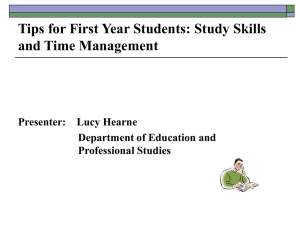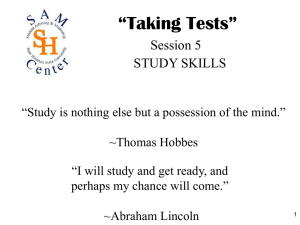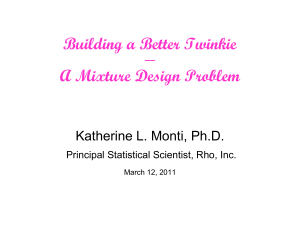International Baccalaureate
advertisement
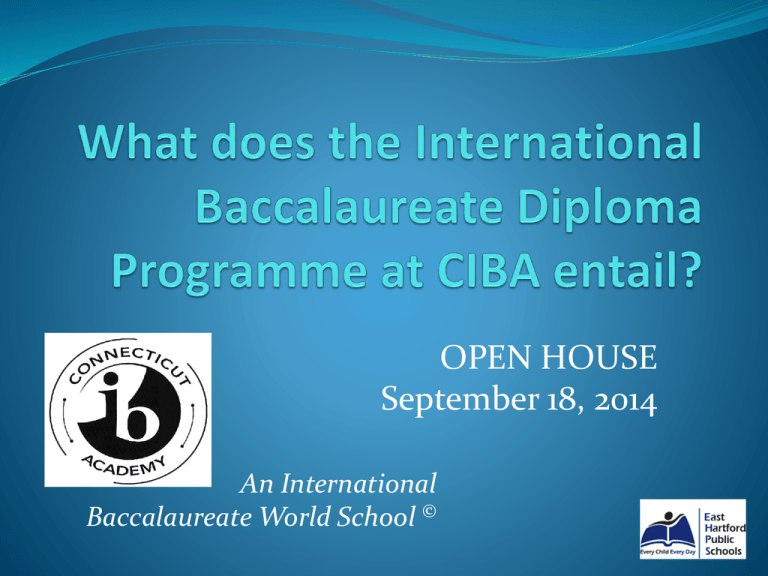
OPEN HOUSE September 18, 2014 An International Baccalaureate World School © CIBA has consistently been recognized for its excellence. National Blue Ribbon School 2006 Magnet Schools of America Top Secondary Magnet School of Excellence 2009 Magnet School of Excellence Merit School of Distinction Nationally ranked as a top U.S. Public High School by September 2014 CIBA was ranked the #1 Best High School in Connecticut, the # 13th in the Northeast, and the #49th in the USA. Newsweek Washington Post US News and World Report CIBA Mission Statement The Connecticut IB Academy, a public high school with worldwide academic standards, connects a rigorous, pre-university curriculum to the world beyond the classroom by demonstrating the interrelationships among the academic disciplines, by promoting international understanding, and by establishing a balance among academic, artistic, and social activities in order to produce responsible, ethical, thoughtful, and informed citizens who are prepared to be global leaders. The International Baccalaureate What is the International Baccalaureate? The Primary Years Programme (PYP) (O’Connell Grades K-5) The Middle Years Programme (MYP) (Grades 6-10) The Diploma Programme (DP) (CIBA grades 11-12) The Career Related Certificate (CC) About the Academic Program at CIBA Grades 9-10: Pre-IB (to become IB- Middle Years Programme (MYP) over the next three years) Academic preparation for the International Baccalaureate Diploma Programme (DP) in grades 11-12 Video on DP Beginning of Junior Year Students will declare if they intend to be Diploma Candidates Students are formally inducted as Diploma Candidates in an Inauguration Ceremony (November 5) Students take IB classes (3 HL and 3 SL over 2 years (except Chemistry) in the Six core areas What is the IB Diploma Programme? Elements Learner Profile Six Subject Groups with clearly articulated aims and objectives & externally moderated exams Theory of Knowledge Extended Essay CAS (Creativity, Action, Service) Conceptual teaching & learning Approaches to Learning International Mindedness The IB learner profile Inquirers Open-minded Knowledgeable Caring Thinkers Risk-takers Communicators Balanced Principled Reflective International Mindedness Education for international mindedness values the world as the broadest context for learning, develops conceptual understanding across a range of subjects and offers opportunities to inquire, act and reflect. Approaches to Learning Communication Social Self management Research Thinking IB-DP Subject Groups Group One: Studies in Language & Literature Group Two: Language Acquisition Group Three: Individuals and Societies Group Four: Sciences Group Five: Mathematics Group Six: The Arts IB Core: Theory of Knowledge, Extended Essay, CAS CIBA Program of Studies IB Exams The Exams are in May of the Senior Year for all 2-year courses May of Junior year for 1-year courses Each subject exam is over two days Exam dates are in the Student agenda planner Students are scored on the exams internally (predicted score) and externally by the IB They are scores on a scale of 1-7 3 is passing; most colleges require a 4 or 5 for credit Theory of Knowledge (TOK) Interdisciplinary course that requires student to think about how we know, and what we know It ties the work in all of the disciplines together Students are scored in TOK on a scale of A-E Extended Essay In their Junior Year students research and write a 3000 word paper on a topic about which they are passioate. Extended Essay (EE) is scored on a scale of A-E internally and externally. The IB combines the TOK and EE scores and assigns them a value of 1-3. Students must have a 2 on TOK/EE to earn the Diploma Creativity, Action, Service (CAS) ALL CIBA students must complete CAS in order to graduate with or without the IB Diploma Students must design and complete a CAS Project that brings together their academic learning, their personal interests and international mindedness to demonstrate real world application of their learning. This is completes an INDEPENDENT student-driven project. Parental involvement is not permitted. Students must also complete service learning hours. Students earn the IB Diploma by Completing 3 HL courses and passing the external exam with a minimum score on each and a minimum combined total number of point for all three Completing 3 SL courses and passing the external exam as above Completing and receiving a satisfactory score on the Extended Essay and Theory Of Knowledge Completion of CAS requirements How does CIBA do? Students who are NOT Diploma Candidates also take the IB Exams -most take 4 or 5 exams 60-70% of CIBA students attempt the full diploma ( we want 100% to attempt) Of those, 60% achieve it Those who do NOT attempt the full Diploma average about a 4 on each exam DP Students better prepared for University Educator David Conley and EPIC research team find IB Diploma Programme students better prepared for university “When they reported their early experiences at university, all the Diploma Programme (DP) students agreed that they were academically adjusted “the moment they stepped on campus”. They indicated that they were not intimidated by the heavy workload required of them in college honors courses. The Diploma Programme, they cited, taught them how to balance coursework and manage their time. ” College Credit for IB Exams Each college and university sets its own policy for awarding college credit for IB exams. (just as it does for AP) Go to the admissions office page of the college or university in which you are interested and examine their requirements. a 2014 CIBA graduate has received 24 college credits from Boston University for achieving the IB Diploma (a year of University) Examples - NYU IB Credit Credit and/or advanced standing is typically awarded for grades of 6 or 7 on the International Baccalaureate (IB) higher level examinations taken before graduation. No credit will be awarded for tests taken after the completion of high school. In order to receive credit, you must have official score results sent directly from the International Baccalaureate Organization to the Office of Undergraduate Admissions. Stanford University A maximum of 45 quarter units of transfer and test credit may be applied toward the undergraduate degree. Only higher level IB exams with scores of 5 or higher, in the subjects listed below, are eligible for credit. Subjects not listed on this chart are not eligible for IB credit. Scores of 5 or higher on language IB exams fulfill the language requirement. If Stanford courses are taken below the level of the placement course, the corresponding IB units will be removed. Courses taken below the level of placement are considered duplicating courses. MIT Credit for Previous Study - International Baccalaureate (IB) MIT recognizes and gives credit for high scores on certain Higher Level (HL) International Baccalaureate examinations, based on appropriate documentation. What can CIBA parents do? Support their students by ensuring a quiet place for study. Support their students in time management. The average amount of written homework per night is about 2 hours Students often procrastinate on long-term assignments resulting in late nights. Students should be reading, studying and reviewing about an 30-45 minutes (total) each night ain addition to written work. What can CIBA parents do? Try to ensure that your student gets adequate sleep. Sleep-deprived students perform poorly in class and on the exams. Ensure that they are in school unless sick. Participate in the PAC activities to support students during stressful times (mid-terms, finals, IB exams. Other important items We MUST have your email address(es). The Newsletter and important announcements are sent via html email to you through School Messenger We CAN send you emergency announcements and information of closings, early dismissals via SMS IF you provide us with a phone number capable of receiving text messages. You will also receive a school messenger phone call if we have a closing, late opening or early dismissal. Other Important Items PLEASE, PLEASE – if your family qualifies for free and/or reduced lunch, APPLY (even if your child doesn’t want to eat the café food) They are eligible for breakfast at EHHS. Well nourished students are focused and alert. ADDITIONALLY – the % of students eligible for F/R lunches makes CIBA eligible for grants and even individual students at CIBA eligible for scholarships that are ONLY awarded to students in schools with a certain % of F/R lunch The MOST important support from CIBA parents? PAC My contact information: Mrs. Caryn W. Stedman, Principal stedman.cw@easthartford.org 860-622-5590 www.ciba.net.org For IB information: www.ibo.org
